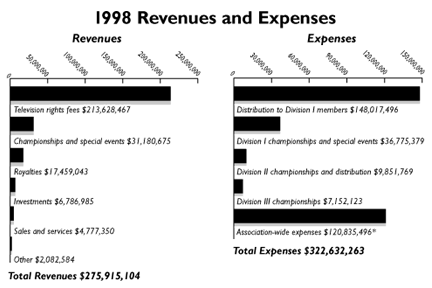The NCAA News - News and Features
The NCAA News -- February 1, 1999
Executive Committee approves changes in travel policies
 Group takes other actions that should result in significant cost savings for the Association Group takes other actions that should result in significant cost savings for the Association
In addition to adopting bat diameter and weight/length difference specifications for baseball bats to be used in the 1999 NCAA baseball championships, the NCAA Executive Committee approved several expenditure-savings proposals and reviewed other Association-wide budget issues during its January 12 meeting in San Antonio.
Though much of the committee's time was devoted to the review of bat standards and the development of an independent panel to study risk and game integrity issues in college baseball (see story, page 1), the committee also adopted a set of budget parameters for 1999-2000 and approved several changes in committee travel policies.
Those changes include the elimination of all first-class air travel, effective immediately. In addition, committee members will be strongly encouraged to book airfares at least 30 days in advance of travel to take advantage of zone and other discounted airfares contracted through the airlines.
The NCAA will cover fees associated with ticket changes (normally $75). If reticketing results in additional airfare, then reasonable costs and scheduling changes will be accommodated.
Also, committees will be encouraged to book their meetings at least 12 to 18 months in advance, depending on the size of the committee.
Committees also will be required to conduct 50 percent of their meetings each year in the Indianapolis metropolitan area. Committees that meet only once per year must meet in Indianapolis in alternate years. If a committee meets an odd number of times per year, the number of meetings held in Indianapolis must be equivalent to the average number of meetings held during a two-year period.
The committee noted that the new headquarters building has been designed to include meeting facilities and conference center space so that more meetings can be held at the national office.
The Executive Committee also approved an increase in the maximum hotel room rate for committee meetings -- from $150 per night to $170 per night. That rate will be reviewed annually to adjust for inflation.
It is anticipated that once fully implemented, the changes will allow the Association to avoid future cost increases of approximately $700,000 annually.
Budget parameters
The committee also approved other expenditure-savings proposals, including the sale of the NCAA aircraft and the purchase of executive charter service for selected flights either through the use of charter aircraft or part ownership of an aircraft.
Also approved was the use of technology (for example, the Internet, CD ROM) to save money on formal publications, such as guides and brochures, and informal publications, such as minutes, agendas and supplements.
In other budget-related matters, the committee approved budget parameters for 1999-2000 designed to provide direction to groups within the governance structure in developing budget requests. The parameters were initially approved and submitted by the Executive Committee's Budget Subcommittee.
The following parameters were adopted:
Constitutional guarantees will be honored.
Programmatic increases, including championship bracket expansion, should be funded by reallocations.
Total Association-wide expenses will remain flat other than uncontrollable increases.
Association-wide programmatic budgets will be reviewed in detail over the next several months by the Executive Committee's Budget Subcommittee.
Revenue enhancements that align with the Association's mission and strategic goals will be supported.
The approval of the parameters was part of the committee's review of Association-wide budget matters, which included a review of the 1998 financial report of Association revenues and expenses (see accompanying chart). The audit was conducted by Price Waterhouse Coopers LLP, which issued an unqualified opinion.
Drug-testing protocol
In other action, the committee approved a request from the NCAA Committee on Competitive Safeguards and Medical Aspects of Sports to modify the NCAA drug-testing protocol for specimen collection used during NCAA team/individual championship events.
The proposal to subject student-athletes to same-day drug testing will become effective at the 1999 NCAA men's and women's swimming and diving championships.
The request originated from the NCAA Men's and Women's Swimming and Diving Committee, which had expressed concern that the current drug-testing protocol could allow athletes using banned drugs to avoid detection due to the amount of time between competition and the end-of-championship drug test.
It was noted that the competitive-safeguards committee supports same-day drug testing for all team/individual championship events; however, the new protocol will become effective only for the 1999 swimming and diving championships at this time to accommodate the swimming and diving committee's request.
|